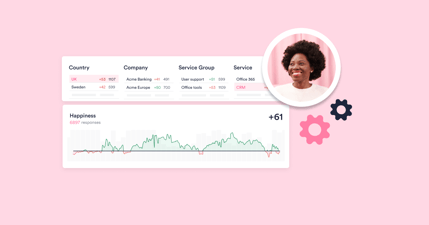The Future of IT Support – A Crowdsourced View
This blog shares the opinions of various IT service management (ITSM) industry authorities on what they think the future of IT support looks like.

To better understand the possible future of corporate IT support, we asked various IT service management (ITSM) industry authorities for their opinions on the changes that will define it. This blog shares some of those opinions, categorized into the following groupings:
- Experiences and productivity will matter more
- Increased people-centricity
- Proactivity
- The move to enterprise support
- Greater technical competency
- Increased reliance on ITSM tool capabilities and guidance
- New technologies will improve IT support
There’s a lot of potential change for IT support ahead. Please keep reading to find out more.
Experiences and productivity will matter more
“IT support has entered the ‘experience economy.’ This means that, in the future, customers want more than just the outputs that service level agreements (SLAs) and key performance indicators (KPIs) bring. Instead, they need outcomes measured through experience level agreement (XLA) metrics. XLAs will be the primary way IT success is measured in the future. For years, we have measured IT success based upon sometimes irrelevant SLAs. In contrast, now we know that the only true measure of success is the success of those people being supported.
We’ve had some great innovations in IT support over the last decade, including artificial intelligence (AI), chatbots, and self-service. However, these innovations will only be viable in the future if our customers believe them to be valuable. Companies are seeing that although IT has made efficiencies (one of the main focuses of the service economy), these are only valid if the customer doesn’t lose productivity. Otherwise, this is a false economy. So, implementing chatbots and self-service for support are great innovations for today. But tomorrow, they will only remain great innovations if the customer has a good experience using them. If not, we’re saving money in IT but pushing a bigger problem elsewhere in the business.” ~ Neil Keating, Co-Founder and Chief Experience Officer, Bright Horse
“The future requires a new paradigm. The nature of IT support needs to change to focus on productivity and risk. Consider the change required when ‘incident management’ becomes ‘productivity management.’ This name change creates a wider impact, including how changes are evaluated, services designed, deployed, and released, etc. Factor in risk (not IT risk, but business risk), and you’re closer to what the future of IT support should become.” ~ David Moskowitz, Executive Director, DVMS Institute LLC
Increased people-centricity
“The future of IT support will likely involve more automation and AI, but with the ever-increasing focus on experience and XLAs, a human-centric approach should remain a foundation to service provision.” ~ Sophie Hussey, Director, Lapis Consulting Services Ltd
“I agree that a human-centric approach will remain a foundational element of future IT support. But I would take this one step further – support will become personalized because of AI, automation, and other improved capabilities. To leverage these capabilities, however, organizations must first fix the things that may not work well today with IT support – poor knowledge capture, ineffective procedures, poor communications, and weak understanding of the business.” ~ Doug Tedder, Principal, Tedder Consulting LLC
“IT support will get even more personal, extending a tailor-made approach to all employees, regardless of whether they work behind a desk, on the road, in the frontline, or anywhere in between. With AI increasingly taking care of the day-to-day tasks, the true human touch comes into play when IT support dives deep into understanding everyone’s unique needs. They won’t just be there to fix problems; they’ll focus on genuinely listening and uncovering the essence of what you’re asking, ensuring the technology in your life is perfectly suited just for you, no matter where your workspace is.” ~ Nancy Louisnord, Global Chief Marketing Officer, BeeKeeper
“Cutting customers off from humans as a service provider is not the way. Design for humans: let them choose their channel of choice. If AI lives up to its promise, it may offload volume, but human contact is important to many!” ~ Phyllis Drucker, Developer and Trainer, EZ2BGR8
Proactivity
“I hope that the future of IT Support will be much more proactive, emphasizing problem/root cause resolution and solid change discipline to prevent issues before they become issues. When there is an incident, it’s seen as an opportunity to provide such a positive experience with a relentless customer focus that it leads to greater customer loyalty.” ~ Ken Wendle, Consultant, Edify ITSM
“I think the biggest imperative is to eliminate user downtime: not systems (hopefully we’ve done that by now), but user devices. If we use and integrate the right tools, AI can now help deliver on the promise of proactive problem management – eliminating user incidents or at least logging them and managing them with automation before any downtime occurs.” ~ Phyllis Drucker
The move to enterprise support
“IT support becomes integrated with enterprise support, largely facilitated by AI but with a shift away from a transactional model to a customer-centric conversation.” ~ James Finister, AI Ethicist, Freelance
“IT support will be viewed as Enterprise Support, enabled by AI (knowledge), automatically (L0, L0.5) resolving the issues worked by IT support today. The IT/Enterprise Support model will be a more intelligent swarming model, from the first point of contact to identifying the swarming team needed (complicated and complex per Cynefin). AI will determine who is best suited to work with the customer based on skills (SFIA) and relationships identified for both the customers and support.” ~ John Custy, Service Management Consultant, JPC Group
Greater technical competency
“Frontline support will be more technically skilled to deal with the complex issues that can’t be resolved effectively through self-service and AI. Frontline support will also be better equipped to handle the human element of the emotional impact of these more challenging issues that only they can address.” ~ Doug Rabold, CX Influencer, HCLTech
“What’s the timeline of any future? How far are we from an event horizon? There’s already a boundary beyond which we cannot observe, but AI already impacts us more than we conceive. The closer we come, the further away it seems to move; the more there is to do, the more there is to learn. The point is that our future is only as strong as we are in our present at adapting and sustainable practices. Technology use is stronger in the enterprise’s upcoming leaders, managers, and employees. The ‘tools of trade’ for roles are becoming more inherently demanded. IT support skills are already shifting. I’m seeing calls for ‘prompt engineers’ for both design and support purposes.” ~ Simone Jo Moore, AI Ethicist and Thought Leader, Independent
Increased reliance on ITSM tool capabilities and guidance
“Due to lacking operational maturity and resources to bring about improvements, I can’t see that many IT organizations can adopt AI, including chatbots, with much success or too much extent. So, I think the future of IT support must rely on advancements in service methodology being made available in ITSM tools to facilitate and make viable modern operational improvements/capabilities. The onus is on tool vendors to lead the way by adding modern, superior best practices, such as the USM approach that’s currently growing in popularity.” ~ David Stewart, Owner, Opimise
“It may not happen, but I think that what’s needed is a closer integration between event monitoring and service support. Some organizations have put the work into monitoring and event management, but this is often not integrated into service management tools. Ideally, this would include monitoring relevant proxies for business process events that can anticipate incidents or potential capacity problems. So, an easier interface between infrastructure/business process events is needed to allow integration without deep technical knowledge.” ~ Peter Brooks, Service Governance Consultant, Independent
New technologies will improve IT support
“I’m optimistic that many aspects of IT support that we’ve wanted for a very long time are finally coming to pass with the assistance of new technologies such as generative AI and conversational AI. The repetitive work (‘Have you tried turning it off and on again?’) can be well handled by carefully configured AI in intelligent chatbots or Interactive Virtual Agents (IVAs). Documentation will become automatic as generative AI’s summarization capabilities capture case notes more completely and coherently. AI can pull any new information for inclusion in the knowledge base. Self-healing technologies and anomaly detection will reduce the number of incidents that affect the consumers of IT or dependent automated processes. By paying attention to what matters—to our business and its employees and other stakeholders—IT will better support the explosion of technology that’s undoubtedly on the horizon. I also hope there will be humans in the loop because no one can foresee every eventuality, and sometimes we need to explain things to a person to get the appropriate kind and level of support.” ~ Roy Atkinson, CEO, Clifton Butterfield LLC
What do you think of these predictions for the future of IT support? Please let us know.
Related content

24.04.2024
4 Key IT Support Trends and the Importance of Experience Data
Everyone loves IT service management (ITSM) trend lists. But what’s usually created (in these ITSM trends) lists has ...
Read more >
02.04.2024
Why Humans are the Best Sensors of IT Experience
HappySignals was created with a vision for IT service management (ITSM) to be more human-centric — for IT service ...
Read more >
